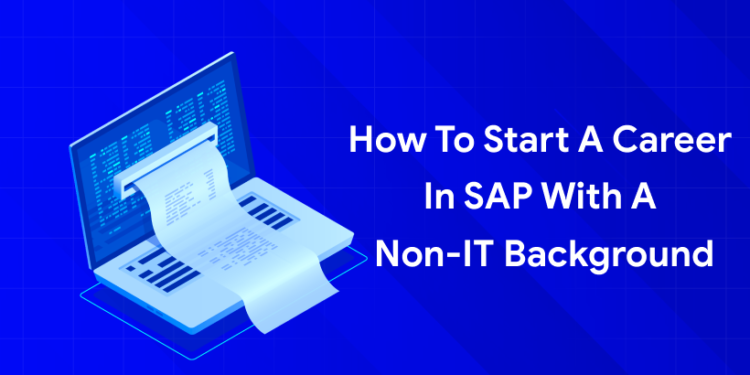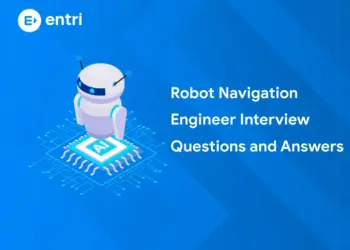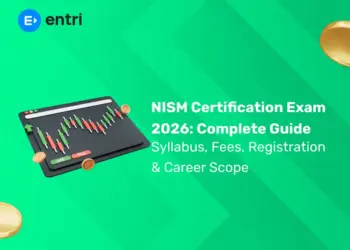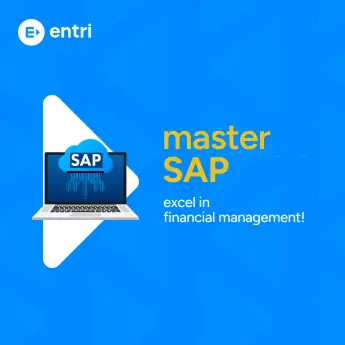Table of Contents
Key Takeaways:
- SAP careers are open to professionals from non-IT backgrounds, especially in functional roles.
- Choosing SAP modules matched to previous experience accelerates learning and job placement.
- Practical exposure, certifications, and networking enhance SAP career prospects.
- Skills like problem-solving, communication, and business understanding are valuable in SAP.
- Entri’s focused SAP courses in FICO, MM, and SD provide strong industry relevance and job support.
Introduction
Are you someone with a background in accounting, business management, retail, HR, or marketing—looking for a new career direction but worried that SAP is “too technical”? Many professionals feel exactly this way, believing SAP is only for coders or those with an engineering degree. But business runs on processes, not just technology, and companies need people who understand real-world challenges, not just systems and software.
SAP powers thousands of companies globally to streamline everything from procurement and sales to finance and HR. The best SAP teams are a blend of tech experts and domain specialists. So, if you’re ready to leverage your existing skillset towards an IT-enabled career, SAP’s functional modules are designed to make that leap possible. Read on to discover the step-by-step roadmap for switching to SAP and how you can use your unique expertise to build a resilient, future-ready career.
Read more at What is SAP?
Why SAP for Non-IT Professionals?
- SAP is business-focused: Most SAP modules involve process management in areas like finance, inventory, and sales—not coding.
- Industry demand: More businesses need SAP-literate staff who can combine business acumen with platform experience.
- Fast-tracked growth: SAP skills command higher salaries and career progression, particularly for those with domain expertise.
- Functional roles: Positions like SAP FICO consultant, SAP SD analyst, or SAP MM manager are tailored for people with non-IT backgrounds.
Master SAP with Expert-Led Courses
Unlock your potential with our comprehensive SAP courses! Learn essential modules like SAP MM (Materials Management), SAP SD (Sales and Distribution), and SAP FICO (Financial Accounting and Controlling) from industry experts.
Know MorePicking the Right SAP Module
Identifying the SAP module that aligns with your previous work experience is crucial. Here’s how the most popular modules fit non-IT profiles:
-
SAP FICO (Finance & Controlling):
- Perfect for finance, accounts, banking, or commerce graduates.
- Handles accounting processes, tax setup, payroll, ledgers, and reporting.
- SAP FICO consultants can move into roles such as Business Analyst, End-User, or Functional Consultant. Entri’s SAP FICO course streamlines practical skills for interviews and real job scenarios.
Read more at How to Be a SAP Certified Professional
-
SAP MM (Materials Management):
- Ideal for those experienced in procurement, inventory management, logistics, or retail operations.
- Manages inventory, purchasing, warehouse, and supplier engagement.
- SAP MM is in high demand in manufacturing, eCommerce, and supply chain sectors. Entri’s SAP MM course focuses on hands-on practice and current business cases.
-
SAP SD (Sales & Distribution):
- Suited for sales managers, marketing professionals, and those in client services.
- Supports sales process management, billing, order fulfillment, and customer data.
- The SAP SD training at Entri includes practical, scenario-based learning and market-relevant placement guidance.
Other modules, such as SAP HR/HCM, SAP SuccessFactors, and SAP BI, are also approachable for non-technical backgrounds. Pick the module where you can apply your practical, business-side experience—it’ll give you an edge over competitors.
Prepare better with Top SAP Interview Questions and Answers
How To Get Started (Step-by-Step)
- Learn the fundamentals: Begin with free resources to understand SAP’s purpose and common terminology. Blogs, YouTube channels, and SAP’s Open Learning are good starts.
- Choose your module: Evaluate your background and interests. SAP FICO for finance, SAP MM for logistics, SAP SD for sales, or others as per domain expertise.
- Enroll in a structured training program: Certification courses (such as those offered by Entri) combine concept learning and projects, with support for interview preparation and placement.
- Gain practical experience: Use online SAP demo platforms, apply for internships, or contribute to hands-on projects to get familiar with the SAP environment.
- Build soft skills: Communication, problem-solving, process documentation, and stakeholder engagement are equally important as software skills.
- Network proactively: Join SAP communities, LinkedIn groups, and forums where professionals share insights, job openings, and tips for career growth.
Here’s a quick read: SAP Career Path – Everything You Need to Know
Tips for Success
- Don’t fear the “technical” label: 90% of SAP project work is business/process-oriented; only a small part is about coding.
- Start with functional modules: Modules like FICO, MM, SD, or HR don’t need programming expertise and leverage business knowledge.
- Invest in certification: SAP certification boosts credibility and helps in job search and career advancement.
- Apply for starter roles: Entry-level jobs like End-User, Support Analyst, Intern, or Project Coordinator help gain pragmatic exposure.
- Showcase soft skills: Problem-solving, clear communication, and adaptability can set candidates apart in interviews.
- Continue learning: Stay updated on SAP updates and trends—adaptability is vital for long-term success.
Master SAP with Expert-Led Courses
Unlock your potential with our comprehensive SAP courses! Learn essential modules like SAP MM (Materials Management), SAP SD (Sales and Distribution), and SAP FICO (Financial Accounting and Controlling) from industry experts.
Know MoreCommon SAP Job Roles for Non-IT Backgrounds
| SAP Job Role | Description | Suitable Backgrounds | Approximate Starting Salary (INR per annum) |
|---|---|---|---|
| SAP Functional Consultant (FICO, MM, SD) | Implements and supports SAP modules related to finance, materials, or sales. Works on configuring SAP to meet business needs. | Finance, Commerce, Supply Chain, Sales | ₹5,00,000 to ₹8,00,000 |
| SAP Business Analyst | Bridges gap between business units and SAP technical teams. Analyzes and improves business processes using SAP. | Business, Operations, Management | ₹4,50,000 to ₹7,00,000 |
| SAP End-User / Support Consultant | Provides daily SAP support to end-users, troubleshoots issues, and assists with SAP functionality. | Any domain with process knowledge | ₹3,50,000 to ₹6,00,000 |
| SAP Project Coordinator / Manager | Coordinates SAP implementation projects, manages schedules, teams, and deliverables without deep technical work. | Management, Operations | ₹6,00,000 to ₹10,00,000 |
| SAP Trainer / Educator | Conducts SAP training sessions, creates learning materials especially for non-technical users. | Teaching, Training, HR | ₹4,00,000 to ₹7,50,000 |
| SAP Data Analyst | Analyzes SAP data to generate business insights and reports, often supporting functional teams. | Analytics, Business Intelligence | ₹4,50,000 to ₹7,50,000 |
| SAP Testing Specialist | Tests SAP functionalities, prepares test cases, and ensures quality before deployment. | Quality Assurance, Operations | ₹4,00,000 to ₹6,50,000 |
| SAP System Administrator (Non-Programmer) | Manages SAP user access, system updates, and routine maintenance without coding. | IT Support, Operations | ₹4,50,000 to ₹7,00,000 |
(Salaries may vary by company and location. Certification and practical experience strongly impact earning potential.) Read more in detail at SAP Consultant Salary
What Employers Look For
- Strong process/domain knowledge, especially in areas aligned with chosen SAP module (e.g., finance for FICO).
- SAP Certification and real-life project exposure, preferably from reputable programs like Entri’s.
- Analytical skills for solving business problems in SAP contexts.
- Experience with documentation, user training, and business communication.
- The ability to bridge gaps between end-users and technical teams.
Why Entri’s SAP Training is Different
- Market-driven curriculum and case studies tailored for non-IT backgrounds.
- Comprehensive, hands-on experience with SAP system demos, not just theoretical knowledge.
- Placement support from mentor-led guidance to mock interviews and resume-building sessions.
- Flexible learning with online access, recorded classes, and doubt resolution forums.
- Programs available for SAP FICO, SD, MM and more—designed for beginners and career-switchers.
Explore Entri’s SAP FICO, SD, and MM courses to accelerate your SAP career transition.
Conclusion
Choosing to step into SAP as a non-IT professional is not just possible—it’s a proven path toward a dynamic, future-ready career. The most successful SAP consultants and analysts are not only tech wizards but also bring deep domain expertise, business sense, and a willingness to learn. With the right blend of practical training, hands-on exposure, and ongoing curiosity, anyone—from accountants and business managers to sales and HR professionals—can carve out a rewarding SAP career.
Remember, digital transformation in business hinges on people who can connect real-world business needs with powerful SAP solutions. Start with focused learning, stay persistent, and let your unique background work in your favor. With resources like Entri’s SAP FICO, SD, and MM courses, a supportive community, and ever-expanding job opportunities, your SAP journey can be the leap that reshapes your professional future for the better.
|
Related Articles |
||
Master SAP with Expert-Led Courses
Unlock your potential with our comprehensive SAP courses! Learn essential modules like SAP MM (Materials Management), SAP SD (Sales and Distribution), and SAP FICO (Financial Accounting and Controlling) from industry experts.
Know MoreFrequently Asked Questions
Do I need programming experience for SAP?
No. Functional SAP modules are business/process-focused and do not require coding skills.
What’s the best SAP module for commerce or management graduates?
SAP FICO for finance/accounting; SAP MM for supply chain/procurement; SAP SD for sales/marketing.
How long does an SAP career transition take?
With focused training, non-IT professionals can be job-ready in 3–6 months, especially if they already have domain knowledge.
Is SAP certification necessary?
It is strongly recommended as it increases job prospects, salary range, and credibility.
What’s the average salary for a fresher SAP consultant?
Entry-level SAP professionals in India can expect ₹5–8 LPA, with increments as they gain experience and certification.
Can non-IT graduates become SAP Project Managers or Solution Architects?
Career progression is possible with experience, domain mastery, and ongoing learning—many SAP leaders come from varied backgrounds.
Are SAP jobs only in IT companies?
No. SAP consultants and end-users are required in manufacturing, retail, FMCG, banking, healthcare, logistics, and more.














